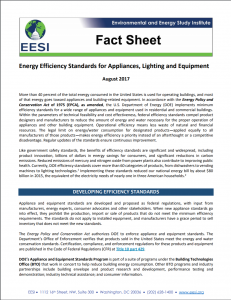Full Title: Energy Efficiency Standards for Appliances, Lighting, and Equipment
Author(s): Environmental and Energy Study Institute
Publisher(s): EESI
Publication Date: August 1, 2017
Full Text: Download Resource
Description (excerpt):
More than 40 percent of the total energy consumed in the United States is used for operating buildings, and most of that energy goes toward appliances and building-related equipment. In accordance with the Energy Policy and Conservation Act of 1975 (EPCA), as amended, the U.S. Department of Energy (DOE) implements minimum efficiency standards for a wide range of appliances and equipment used in residential and commercial buildings. Within the parameters of technical feasibility and cost effectiveness, federal efficiency standards compel product designers and manufacturers to reduce the amount of energy and water necessary for the proper operation of appliances and other building equipment. Operational efficiency means less waste of natural and financial resources. The legal limit on energy/water consumption for designated products—applied equally to all manufacturers of those products—makes energy efficiency a priority instead of an afterthought or a competitive disadvantage. Regular updates of the standards ensure continuous improvement.
Like government safety standards, the benefits of efficiency standards are significant and widespread, including product innovation, billions of dollars in energy savings for consumers, and significant reductions in carbon emissions. Reduced emissions of mercury and nitrogen oxide from power plants also contribute to improving public health. Currently, DOE efficiency standards cover more than 60 categories of products, from dishwashers to vending machines to lighting technologies. Implementing these standards reduced our national energy bill by about $80 billion in 2015, the equivalent of the electricity needs of nearly one in three American households.
